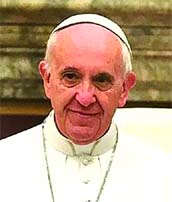
Pope Francis who called for unity in Myanmar without saying ‘Rohingya’, arrives here on Thursday on a three-day state visit carrying a message of harmony, peace, reconciliation and forgiveness.
A planned meeting with a small group of Rohingyas is expected to be a high point during the Pope’s Dhaka visit. On Tuesday in Myanmar, Pope Francis insisted on Myanmar’s future depends on respecting the rights of each ethnic group, an indirect show of support for Rohingya Muslims who have been subject to decades of discrimination and a recent military crackdown described by the UN as a textbook campaign of “ethnic cleansing.”
Francis did not mentionthe crackdown or even utter the contested word “Rohingya” in his speech to Myanmar’s civilian leader, Aung San Suu Kyi, and other authorities and diplomats in the capital.
But he lamented how Myanmar’s people have suffered “and continue to suffer from civil conflict and hostilities,” and insisted that everyone who calls Myanmar home deserves to have their basic human rights and dignity guaranteed.
A papal visit is always historic for any nation, and this one at the invitation of Prime Minister Sheikh Hasina and Catholic Archbishop of Dhaka Cardinal Patrick D’Rozario, was officially announced in Dhaka and the Vatican simultaneously with the same sense of occasion on August 28.
“As I prepare to visit Bangladesh, I wish to send a message of greeting and friendship to entire population. I look forward to the moment in which we shall be together,” he said in a message before leaving Rome for Myanmar.
Cardinal Patrick D’Rozario on Monday briefed the media about the preparation of Pope’s visit to Ramna Cathedral and said the theme of the visit is “peace and harmony.”
The organisers in Dhaka took preparations to bring a small group of Rohingyas to Dhaka with approval of the government.
After a formal ceremony with highest honour, Pope will visit the National Martyr’s Memorial at Savar, pay homage to the Father of the Nation at Bangabandhu Memorial Museum and sign the visitors’ book on the same day.
He is scheduled to meet President Abdul Hamid at Bangabhaban at about 5:30 pm today and will also meet government and civil authorities and the Diplomatic Corps in the Presidential Palace.
Pope will meet Prime Minister Sheikh Hasina at 3:20 pm on Friday and will visit the Cathedral at 4:00 pm.
He will hold a meeting with the Bishops of Bangladesh in the Home for retired priests. On Friday, he would join a prayer service at Suhrawardy Udyan.
On Saturday, Pope will have a private visit to Tejgaon Mother Theresa House and will meet priests, religious and consecrated men and women in the Holy Rosary Church.
He will also visit to the Parish Cemetery and to the ancient Holy Rosary Church and meet the youth in Notre Dame College.
Pope will leave for Rome at 5:05 pm on Saturday after an official farewell in Dhaka International Airport.
“My visit is to confirm the Catholic community in Bangladesh in its faith and witness to the Gospel that recognises the dignity of every man and woman and calls us to open our hearts to others, especially to the poor and needy,” Pope said in his message.
“We live in times in which believers and men of goodwill in all places are called to promote reciprocal understanding and respect, and to sustain each other as members of one human family,” the message reads.
He said he knows there are many people in Bangladesh who are working hard to prepare for his visit and he thanked them.
“I ask each of you for prayers so that my days with you may be a source of hope and encouragement for all. Upon you and your families I invoke the divine blessings of joy and peace! See you before long!,” the message reads.
While the international community has condemned Myanmar’s crackdown on Rohingya Muslims as “ethnic cleansing,” the Catholic Church has resisted the term and defended Myanmar’s civilian leader Aung San Suu Kyi as the only hope for democracy.
At the crowded Kutupalong refugee camp in southern Bangladesh, Mohammad Rafiq said he was very happy when he heard about the visit by Francis, reports AP.
The 20-year-old fled Myanmar last month.
“Our rights, our minority community and our citizenship have been snatched by the Myanmar government,” Rafiq said. “We are hoping that with his talks and his efforts, we will get all of that back.”
Mohammad Nadir Hossain, 25, said Pope will get to see the sad situation that refugees face.
“If he wants, he can calm the Myanmar government down and bring peace by talking to us,” Hossain said. “We are suffering a lot right now. We are very worried. So, we are very grateful that he is coming.”
Rohingya in recent months have been subject to what the United Nations describes as a campaign of “textbook ethnic cleansing” by the military in poverty-wracked Rakhine state.
Since violence erupted in late August, more than 624,000 Rohingya men, women, and children have crossed over into Bangladesh from Myanmar, carrying with them tales of persecution, rape, and murder by the Myanmar military and Buddhist vigilantes.
Whatever term Francis uses, refugees like Hamida Begum, 35, believe the pope is visiting Myanmar to help them. She made the treacherous trip to Bangladesh three months ago.
“He can help send us back to Myanmar legally,” she said. “Or he can take us somewhere else from here, perhaps to some other foreign country. Whatever he wants, he can do.”
Senu Ara, 35, who left Myanmar in September, also welcomes the pope’s visit.
“He might help us get the peace that we are desperately searching for,” she said. “Even if we stay here he will make our situation better. If he decides to send us back, he will do so in a peaceful way.”

